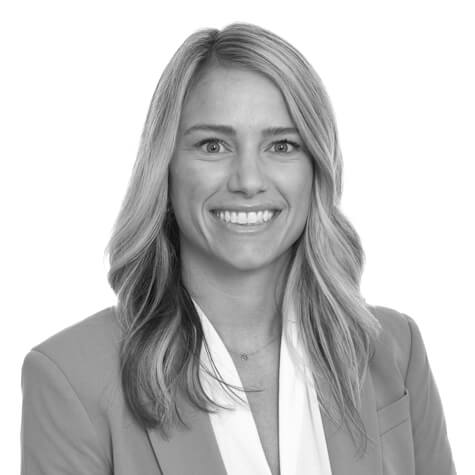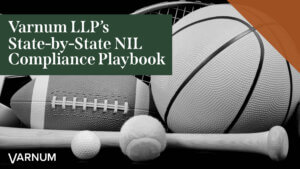In June of 2021, the Supreme Court held that the NCAA cannot restrict education-related benefits, effectively making it legal for student-athletes to earn compensation and commercialize their name, image and likeness (NIL). Following the Court’s decision, the NCAA announced interim policies related to NILs. In addition to the NCAA’s policies, various state legislatures and universities have enacted their own NIL policies. Without a uniform federal response by Congress, student-athletes and other interested parties must ensure they are acting in compliance with all relevant NIL guidelines (i.e., NCAA, institution regulation(s) and state legislation.)
NCAA: Interim Policy and Updated Guidance Regarding Third-Party Booster Involvement
Days after the Supreme Court’s decision, the NCAA announced its interim NIL guidelines. These guidelines took effect July 1, 2021 and will remain in effect until either the federal government enacts uniform legislation or the NCAA adopts new rules. The interim guidelines outlined three overarching policies that member institutions and student-athletes must adhere to:
- The NCAA Bylaws, including prohibitions on pay-for-play and improper recruiting inducements, remain in effect subject to three additional stipulations:
- First, for institutions in states without NIL laws or executive actions, or institutions in states where these laws or executive actions have not yet taken effect, a student-athlete that partakes in NIL activity is still eligible for intercollegiate athletics.
- Second, institutions in states with fully implemented NIL laws or executive actions may engage in NIL activity protected under the relevant law and/or executive order.
- Third, the use of professional service providers is permitted so long as the state law or executive order does not prohibit such activity.
- The NCAA will continue its normal regulatory operations but will not monitor compliance with state law.
- Individuals should report NIL activities as required by state law and institutional requirements.
On May 9, 2022, the NCAA issued an update to its NIL guidelines, which pertained specifically to third-party “booster” involvement in the recruiting process. The update clarified that the NCAA’s broad definition of “booster” remains in effect and includes NIL collectives (i.e., those organizations formed by an institution’s alumni that funnels NIL deals to prospective student-athletes and/or those in the transfer portal). As it pertains to third-party “booster” involvement, the update lists prohibited conduct for prospective and current student-athletes.
State Legislation: Summary of Michigan Law
On December 30, 2020, Governor Gretchen Whitmer signed HB 5217, which outlines the state’s NIL guidelines. However, HB 5217 does not take effect until December 31, 2022. This legislation is similar to the University of Michigan’s policy outlined below, but can be summarized as follows:
Covered Institutions: A post-secondary educational institution may not prevent student-athletes from participating in college athletics based on their NIL activities.
Regulatory Organization: Any group or organization with authority over intercollegiate athletics may not:
- Prevent a student-athlete from fully participating in athletics based upon their NIL compensation;
- Prevent an institution from fully participating in intercollegiate athletics based upon student-athletes engaging in NIL activities;
- Prevent or interfere with a student-athlete’s decision to obtain professional representation (i.e., agent, financial advisor or legal representation) in relation to their NIL contract or legal matters; or
- Provide NIL compensation to prospective college athletes.
Compensation: An institution is prohibited from revoking or reducing a student-athlete’s grant-in aid or stipend scholarship based upon their NIL compensation. There is no requirement that a group or organization with authority over intercollegiate athletics identify, create, facilitate, negotiate or otherwise enable opportunities for a student-athlete to earn NIL compensation.
Professional Advisors: Any group or organization with authority over intercollegiate athletics is prohibited from interfering or preventing a student-athlete from fully participating in intercollegiate athletics based upon the student-athlete obtaining professional representation in relation to their NIL activities. Should a student-athlete obtain professional representation in relation to their NIL opportunities, an institution may not be prevented from full participation in intercollegiate athletics. Any professional representation must be licensed in the state in accordance with the applicable licensing requirements.
Restrictions: Certain NIL activities are prohibited, such as a student-athlete’s contract for NIL compensation, which requires the student-athlete to advertise during official team activities, if the provision conflicts with the institution’s team contract. It is important to note that institutions are not prohibited from establishing and enforcing their own standards, requirements, regulations, team rules or codes, disciplinary rules or other obligations for its student-athletes.
Disclosure Requirements: A student-athlete who enters into a verbal or written opportunity or contract for NIL compensation must disclose this opportunity or contract to the institution at least seven days prior to committing to the opportunity or contract. Further, the law also outlines the information that must be in the disclosures, the review procedure and timeline. Importantly, the disclosure requirements do not apply to contracts entered into, modified or renewed on or before December 31, 2022.
Legal Settlement: A legal settlement arising from HB 5217 does not permit non-compliance with the statute.
Nonprofit Trade Association: Any nonprofit trade association, which represented any institution in the state, must provide various members of Congress with specific information from years 2020 and 2021.
Licensing Requirements: Student-athletes do not have the right to use an institution’s intellectual property without the appropriate licensing approval.
Institutions: University of Michigan NIL Policy
The University of Michigan (U-M) released its own NIL policy for student-athletes in June 2021. Until the State of Michigan’s NIL legislation takes effect on December 31, 2022, U-M’s policy will govern the institution’s student-athletes. U-M’s policy is consistent with the NCAA’s guidelines; however, its policy is more extensive. Key provisions of the policy can be summarized as follows:
Permitted Activities: The policy provides a non-exhaustive list of permitted NIL activities that student-athletes may engage in. There are no limits on the amount of income a student-athlete may earn so long as the compensation is for work actually performed.
Compensation: Student-athletes may neither receive compensation conditioned on enrollment, or continued enrollment, at a specific collegiate institution nor may they receive compensation contingent upon a specific athletic performance or achievement.
Restrictions: Student-athletes may not miss any required educational or team activities for any NIL activities. A student-athlete’s participation in NIL activities must comply with all relevant standards and/or guidelines. Further, as student-athletes are considered public representatives of the university, U-M imposes certain restrictions on their NIL activities.
Disclosure Requirements: There are specific disclosure requirements for activities that took place between July 1, 2021 and July 15, 2021, activities that took place July 16, 2021 onward, and activities beginning February 9, 2022 onward. Further, the policy outlines the information that must be in the disclosures, U-M’s review procedure and timeline.
University of Michigan Liability: U-M is not responsible for:
- Providing or procuring any NIL opportunities for any student-athlete(s); and
- Any tax liabilities or other costs student-athletes may incur from their NIL activities.
Licensing Requirements: Student-athletes may not use any intellectual property without appropriate licensing approval. Further, U-M will not purchase any products or services from any student-athlete(s) unless it is through a bidding process overseen by U-M’s procurement office.
Professional Advisors: Student-athletes may utilize professional advisors (such as marketing agents, tax advisors, legal advisors, etc.) to assist them with their NIL activities but must pay the normal costs associated with such services. However, student-athletes are prohibited from using an agent to negotiate with professional athletic teams or organizations.
Varnum’s team of experienced practitioners continually monitors NIL activity at the federal, state and institutional levels. Contact a member of our team for additional insight.
This article was co-written by Lindsay Randolph, a summer associate at Varnum in 2022. Lindsay is currently a student at Wayne State University Law School.
Free Download
To aid individuals, schools and collectives with the often inconsistent and rapidly developing legislative and executive actions of the states, Varnum’s dedicated team of NIL attorneys created an all-inclusive, state-by-state compliance playbook. Learn more and download your free copy: www.varnumlaw.com/state-by-state-nil-compliance-guide/



